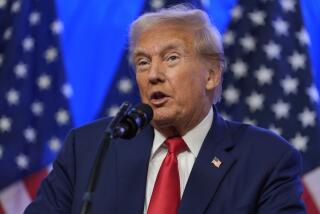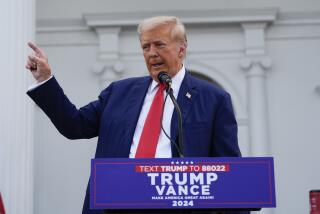Most of Trump’s merchandising empire has faded
Before he ran for office, Donald Trump made millions of dollars by selling his name to adorn other people’s products. There was Trump deodorant. Trump ties. Trump steaks. Trump underwear. Trump furniture. At one time, there was even a Trump-branded urine test.
Now, almost all of them are gone.
In 2015, Trump listed 19 companies that were paying him to produce or distribute Trump-branded consumer goods.
In recent weeks, only two said they are still selling Trump-branded goods. One is a Panamanian company selling Trump bed linens and home goods. The other is a Turkish company selling Trump furniture.
Of the rest, some Trump partners quit in reaction to campaign-trail rhetoric on immigrants and Muslims. Others said their licensing agreements had expired. Others said nothing beyond confirming that they’d stopped working with Trump. Their last Trump goods are now being sold off, often at a discount. One cologne is marked down by an online retailer to $9.99 an ounce, from $42.
“Success by Trump,” the website says. And below that: “Clearance.”
The decline of the Trump merchandise empire is another sign of how politics has changed the president’s business. On one hand, it has enabled his Mar-a-Lago resort in Florida and his Washington, D.C., hotel to monetize his political alliances, raking in money from evangelical Christian groups and GOP campaigns. But on the other, it has driven away customers and partners who had been drawn to the old Trump — a hustling icon of ostentatious wealth, who sold golf memberships to the truly rich and $42 cologne to those who merely wanted to be.
“Once the political campaign started, the wall went up,” said Marshal Cohen, who measures retail business trends for the NPD Group. “The wall that he [built] was more around his merchandise than it was around Mexico.”
The Trump Organization did not respond to questions about its licensed-merchandise business. Trump has said he has given up day-to-day management of his company while he’s in the White House. But he still owns it.
The Trump Organization sells its own name-branded merchandise. Last year, it opened an e-commerce site, TrumpStore.com, with an inventory of Trump T-shirts, teddy bears and key chains.
But the licensed merchandise business was something different. It enabled Trump to make money off other people’s work, other people’s products, other people’s marketing.
All Trump had to do was sell something that he could never run out of: his name.
Trump first pursued the idea in 2004. His emissaries contacted an executive at Phillips-Van Heusen, the menswear giant, with a proposition.
How would his company like to pay Trump for the right to put his name on their clothes?
The menswear executive wasn’t interested.
“He laughed,” Jeff Danzer, who was a marketer working for Trump, recalled later.
At that point, Trump was still emerging from the long, low years of the 1990s: huge debts, corporate bankruptcies, tabloid divorces. What customer wanted that on their shirt collar?
But then “The Apprentice” TV show took off — and it rebranded Trump as a sharp-dressed boardroom titan. After that, the idea of Trump shirts wasn’t laughable. In fact, it wasn’t enough.
“Suits, dress shirts, ties, even down to shoes,” Danzer recalled. “Any and everything that you would wear in the boardroom is what we were going out to license.”
By the end of 2004, Trump had a deal with Phillips-Van Heusen and a Donald J. Trump Signature Collection of clothes at Macy’s.
But that wasn’t enough, either.
Eventually, Trump was a smell — a “masculine combination of rich vetiver, tonka bean, birchwood and musk.” Trump was a chandelier. Trump was a mattress. Trump was a steak. “The meat category represents Mr. Trump’s power,” an underling told the media when Trump Steaks launched.
Trump was a urine test.
“Take a snapshot of the most critical metabolic markers in your body’s natural waste fluids,” said the website for the Trump Network, a vitamin company that sent its customers urine-testing kits with the Trump logo on them. The tests would be used to determine what vitamins the customer needed, according to archived versions of the Trump Network website.
The rest of the marketing business shook its head. But, for a time, it worked.
“A caricature of what wealth is — as opposed to what real wealth is,” said Milton Pedraza, chief executive of the Luxury Institute, a consultant to luxury brands, in explaining the appeal of the items. Trump sold to those “who didn’t know the difference,” he said.
However, Pedraza said, Trump began to undermine his own success by “label slapping” — sticking his name on anything he could, even the farfetched and ridiculous. Emeril Lagasse sold pots. Greg Norman sold golf shirts. Trump sold everything.
“There was no strategy,” Pedraza said.
In 2009, Trump reported that his licensing partners had sold $215 million worth of Trump-licensed goods worldwide. That ranked him 80th on License Global magazine’s list of the top 125 merchandisers. In some years, Phillips-Van Heusen alone paid him more than $1 million.
For Trump, the benefit wasn’t just the money. The items brought his name into closets and kitchens nationwide.
“It’s ties, shirts, cuff links, everything sold at Macy’s. And they’re doing great,” Trump told David Letterman in 2012 during an interview in which he also complained that China was overtaking the United States as an economic power. “No. 1 selling tie anywhere in the world.”
“The ties are made in China,” Letterman said.
By 2015, some of his more far-out ideas — steaks, urine tests and vitamins — were already kaput. But according to his financial disclosures, the 19 remaining licensees were still paying him a combined $2.4 million-plus per year, just to put the Trump name on their goods.
Then Trump ran for president.
Within a few weeks, the number was down to 14.
“We are disappointed and distressed by recent remarks about immigrants from Mexico,” said a corporate statement that Macy’s issued after Trump called Mexican immigrants criminals and “rapists” at his first campaign event. “We have decided to discontinue our business relationship with Mr. Trump.”
Losing Macy’s meant losing all the Trump merchandise that Macy’s had sold. Phillips-Van Heusen, his first big deal. Peerless, which made Trump suits. Parlux, which made his colognes. Another company made Trump belts. All gone.
Serta, which made Trump Home mattresses, had been one of his most lucrative partners. Trump lost that partnership too.
“They’ll all be back,” Trump told Forbes magazine.
A few months later, Trump called for a “total and complete shutdown” of Muslims entering the United States. He lost another partner, a Dubai company that had a license to sell Trump furniture in the Middle East, Africa and India.
That left 13.
What happened to the rest?
To find out, The Washington Post and the Investigative Reporting Workshop at American University tried to contact the remaining companies that Trump had listed as licensing partners on his 2015 financial disclosure forms.
In one case, a Southern California company was mystified to have been listed at all.
“We haven’t done business [with him] for a long time,” said Jim Ehren, an executive at Crystal Art Gallery in Vernon. His company’s Sign of the Times division once made inspirational posters that paired Trump quotes with scenes of Wall Street or a golf course. But not recently.
Two other partnerships — one to sell Trump-branded shoes in Mexico, the other to sell Trump home organizational products — apparently had ended before any Trump-branded merchandise was sold.
That left 10.
Trump vodka also seems dead. It had survived in Israel after fizzling elsewhere. But Trump’s own financial disclosures don’t list it after 2015.
Trump coffee, also, is no more. “It was a lack of sales,” said Sam Blaney at Two Rivers Coffee of South Plainfield, N.J., which stopped making its Select by Trump coffee pods last year. “Not every idea was a good idea.”
A company named Downlite had sold Trump-branded pillows but said it let the license expire in 2015. “Purely a business decision,” said Josh Werthaiser, the company’s chief executive. “It had nothing to do with the election.”
That left seven.
Of those, five companies said that they weren’t making Trump products anymore but gave little detail beyond that.
Wonu, which made Trump-branded bedding in Korea, said simply that its license had expired. Ditto for the makers of Donald J. Trump eyeglasses. A French company that once made Trump mattresses has been sold. Its new owner said the company doesn’t make them anymore.
At the company that once made Trump-branded throw blankets, executives did not call back. When a Post journalist visited its office, a receptionist said she didn’t know of any Trump products being made there now.
At Elk Lighting of Pennsylvania, a staffer said the company has stopped making Trump-branded chandeliers and sconces. On its website, the company’s Trump Home Regency chandeliers are now sold as just “Regency.”
Since Trump began his presidential campaign, the Trump Organization’s website has not added any listings of new manufacturers to replace those it has lost. In Trump’s 2017 financial disclosure, he reported that his royalties from licensed merchandise had fallen from more than $2.4 million to just over $370,000. The forms do not give exact numbers, only a range of values that the figures fall between.
Only two companies are still paying to put Trump’s name on their products.
One is HomeStudio, which produces Trump-branded bed linens and housewares for the Latin American market. It declined to comment for this story beyond confirming that it still makes Trump goods.
The other is Dorya, a Turkey-based manufacturer of Trump Home Collection furniture.
When a reporter visited the company’s Chicago showroom recently, there was a room full of sleek, modern, expensive chairs and tables. But the Trump name was hard to find unless you knew where to look.
On one $4,000 end table, for instance, the silver nameplate reading “Trump” — the name Dorya was paying to use — wasn’t on the outside of the piece at all.
To find it, customers had to look inside the drawer.
This report was produced in partnership with the Investigative Reporting Workshop at American University.
More to Read
Inside the business of entertainment
The Wide Shot brings you news, analysis and insights on everything from streaming wars to production — and what it all means for the future.
You may occasionally receive promotional content from the Los Angeles Times.










